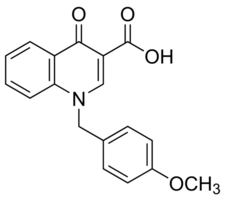All AbMole products are for research use only, cannot be used for human consumption.

For this product's availability, delivery time and price, please email [email protected] directly or click the "Inquiry Now" button below.
BQCA is a potent muscarinic M1 receptor positive allosteric regulator with higher selectivity to M1 than M2-M5. It enhances M1 activity in vitro and in vivo trials and has oral bioavailability. Muscarinic 1 (M1) receptors are expressed in brain regions responsible for attention and memory, including the hippocampus, cortex, and striatum. BQCA binds to M1 in a allosteric manner, enhancing the binding and potency of ACh on the receptor. M1 activation is a proposed mechanism for increasing information processing in disease states such as Alzheimer's disease. M1 agonists are currently being investigated as potential compounds for the study of cognitive and negative symptoms in Alzheimer's disease and schizophrenia. BQCA has been shown to improve performance on cognitive tasks and increase brain blood flow.
| Molecular Weight | 309.32 |
| Formula | C18H15NO4 |
| CAS Number | 338747-41-4 |
| Solubility (25°C) | DMSO: 10 mg/mL |
| Storage |
Powder -20°C 3 years ; 4°C 2 years In solvent -80°C 6 months ; -20°C 1 month |
| Related Products |
|---|
| 2-Deoxy-2-fluoro-D-glucose
2-Deoxy-2-fluoro-D-glucose is a radiolabeled glucose analog, which is commonly used in medical imaging techniques such as positron emission tomography (PET) scans. |
| 2-Bromo-4-chlorophenylacetic acid
2-Bromo-4-chlorophenylacetic acid is a biochemical reagent. |
| CPN-351 TFA
CPN-351 TFA is a selective pentapeptide antagonist of human NMUR1 with a pA2 of 7.35. CPN-351 TFA can be used for the research of inflammation. |
| 5-Phenyluracil
5-Phenyluracil is a pyrimidine derivative, a class of heterocyclic aromatic organic compounds crucial in biochemistry. It serves as a synthetic nucleoside analogue, meaning it mimics the structure of naturally occurring nucleosides like uridine. This structural similarity allows it to participate in biochemical reactions, often interfering with normal cellular processes, making it a valuable tool in studying nucleic acid metabolism and developing antiviral and anticancer agents. |
| 7-Deoxyloganin
7-Deoxyloganin is a biosynthetic precursor of Loganin. 7-Deoxyloganin undergoes hydroxylation catalyzed by 7-deoxyloganin 7-hydroxylase, a cytochrome P450-dependent monooxygenase, to produce Loganin. |
All AbMole products are for research use only, cannot be used for human consumption or veterinary use. We do not provide products or services to individuals. Please comply with the intended use and do not use AbMole products for any other purpose.


Products are for research use only. Not for human use. We do not sell to patients.
© Copyright 2010-2024 AbMole BioScience. All Rights Reserved.
